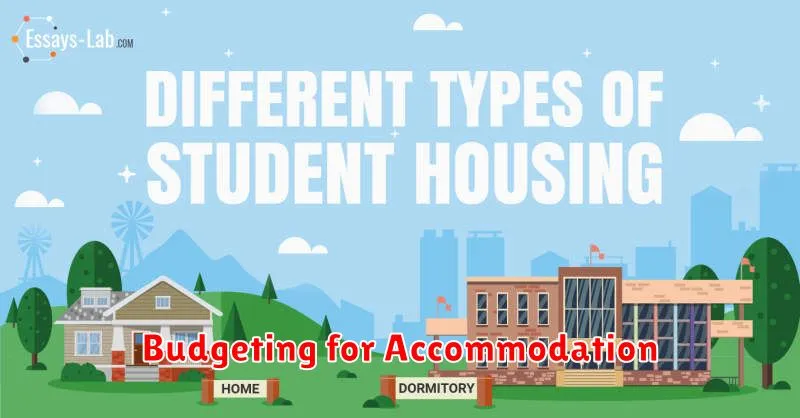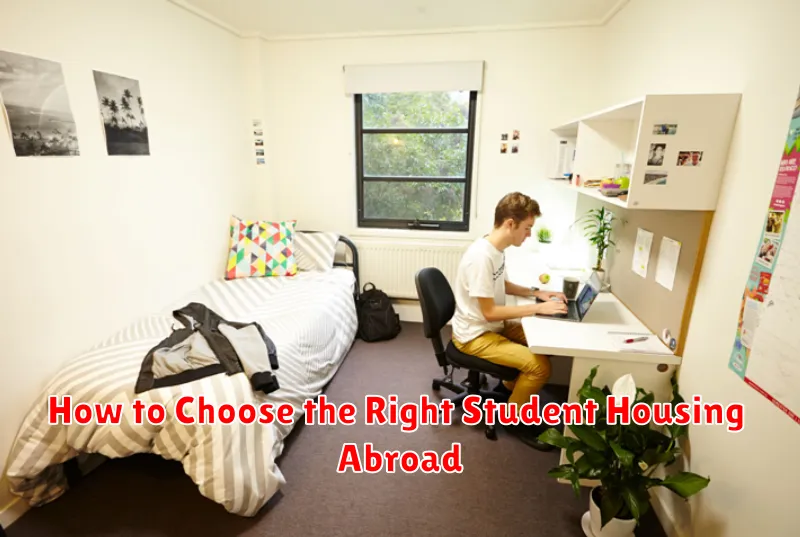Choosing the right student housing abroad is a crucial step in ensuring a successful and enriching international study experience. Student accommodation plays a significant role in your overall well-being, academic performance, and cultural immersion. Making an informed decision about your housing options requires careful consideration of various factors, including budget, proximity to your institution, preferred living arrangements, and the local cultural context. This guide will provide you with essential insights and practical tips to navigate the process of finding the perfect student housing abroad, allowing you to focus on what truly matters – your studies and embracing a new culture.
Whether you are looking for a student apartment, a university dormitory, a homestay, or a shared housing option, understanding the nuances of each type of student accommodation is essential. From navigating different lease agreements and understanding local regulations to considering the social dynamics of shared living spaces, this article will equip you with the knowledge to make a confident choice. Selecting appropriate student housing abroad not only provides a comfortable and safe living environment but also fosters a sense of belonging and facilitates integration into the host country’s culture. By carefully considering your needs and preferences, you can find student housing that becomes your home away from home, enhancing your overall study abroad journey.
Types of Student Housing
When considering student housing abroad, understanding the various types available is crucial. Each option offers a unique living experience and caters to different needs and budgets.
University-managed accommodation typically includes dormitories or residence halls located on or near campus. These options provide convenient access to university facilities and often foster a strong sense of community.
Private housing encompasses a broader range of options, such as apartments, shared houses, and homestays. These can offer greater independence and flexibility, but require more independent management of utilities and other living arrangements.
Budgeting for Accommodation

Accommodation is typically the largest expense for students studying abroad. Establish a realistic budget early in your planning process. Consider the cost of living in your chosen city, which can vary significantly.
Research different housing options, including university dormitories, shared apartments, and homestays. Each option comes with its own price range. Factor in additional costs like utilities, internet, and transportation to and from campus.
Saving in advance and exploring scholarship opportunities specifically for housing can significantly ease the financial burden.
Location and Commute Time
Location plays a vital role in your overall study abroad experience. Consider proximity to your university. A shorter commute saves time and money.
Think about the neighborhood’s safety and amenities. Easy access to grocery stores, pharmacies, and social hubs can significantly improve your quality of life.
Evaluate your commute options. Is public transportation readily available, reliable, and affordable? Will you need a bike or car? Factor in commute time, especially during peak hours.
Roommate Considerations
Choosing the right roommate is crucial for a positive living experience. Compatibility is key. Consider factors like cleanliness, study habits, and social preferences. Do you prefer a quiet environment or a more social atmosphere? Open communication about expectations from the start can prevent conflicts later.
Think about whether you’d prefer a roommate from your home country for a sense of familiarity, or if embracing cultural exchange with a local student is more appealing. Ultimately, finding a roommate with shared values and lifestyles can significantly enhance your time abroad.
Facilities and Amenities
When choosing student housing, carefully consider the offered facilities and amenities. Essential features often include laundry, internet access, and basic furnishings. Think about what makes you feel comfortable and productive.
Some accommodations may offer additional amenities like study areas, gyms, or social spaces. These can enhance your living experience but often come at a premium cost. Prioritize your needs and budget when evaluating these options.
Safety and Neighborhood Assessment
Safety should be a primary concern when choosing student housing abroad. Research the neighborhood’s crime rates and consider factors like street lighting and proximity to emergency services.
Assess the neighborhood’s atmosphere. Is it student-friendly? Are there amenities like grocery stores, pharmacies, and public transportation within walking distance? Consider the commute time to your university.
Lease Agreements and Contracts
Carefully review any lease agreement or contract before signing. Understand your rights and responsibilities as a tenant.
Pay close attention to the lease duration, payment terms, and any included utilities. Clarify any unclear clauses with the landlord or agency.
Online Reviews and Community Feedback
Thoroughly research potential housing options by checking online reviews and community forums. Websites dedicated to student accommodations often feature feedback from previous tenants.
Pay close attention to comments regarding safety, cleanliness, management responsiveness, and the overall student experience. These platforms offer valuable insights that can significantly influence your decision-making process.
Furnishing and Essentials
Furnishings vary greatly between student accommodations. Some may be fully furnished, while others offer only basic necessities. Clarify what is provided beforehand. Consider packing essential, lightweight items that can enhance comfort, like a favorite pillow or a small throw blanket.
Regarding essentials, research the local climate. This will inform your packing choices for clothing and other necessities. Remember to bring important documents like your passport, visa, and acceptance letter. Keep these secure throughout your stay.
Emergency Contact Accessibility
Immediate access to emergency contacts is crucial when studying abroad. Ensure your chosen housing provides reliable communication methods. Consider whether the accommodation offers consistent internet access for contacting family or friends back home.
Research local emergency numbers and ensure they are readily accessible. Confirm the housing provider’s protocols for emergencies. Do they have on-site staff or a clear system for contacting emergency services? This information is vital for your safety and peace of mind.

